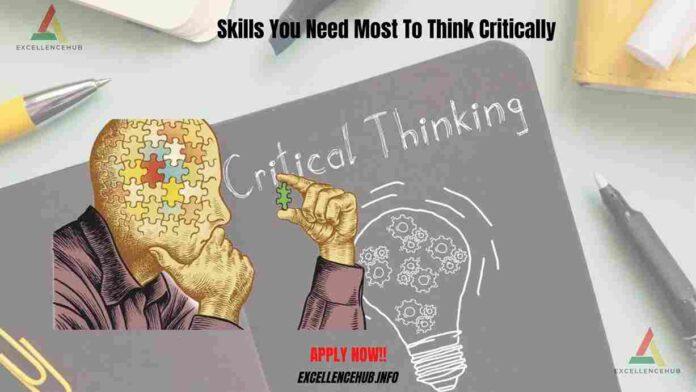Skills You Need Most to Think Critically. Do you ever find it challenging to make decisions or doubt the veracity of the information you read or hear? In this case, mastering critical thinking skills will help you overcome these obstacles. So, what exactly does critical thought entail? They are capable of analyzing, evaluating, and interpreting information rationally and methodically. In today’s world of constant information inundation, the ability to think critically is more important than ever. Let’s examine how you can enhance your critical thinking and decision-making skills.
What are critical reasoning abilities?
Critical thinking is the ability to objectively and meticulously analyze, evaluate, and comprehend information. Those with these cognitive abilities are more capable of recognizing assumptions, evaluating arguments, and reaching logical conclusions. Critical thinking skills are necessary for academic, professional, and personal success. Skills You Need Most to Think Critically.
Why is critical reasoning so crucial?
Critical reasoning skills are more important than ever before in today’s society. Given the abundance of available news, it is essential to sift through the information and determine what is reliable and pertinent. Your ability to manage complex issues, make informed decisions, and interact effectively with others depends on your critical thinking skills.
Consider that you are a student who struggles to make conceptual connections and develop interpretations. To earn higher grades and comprehend more difficult material, you must devote time and effort to enhancing your critical thinking skills. This will allow you to comprehend why college requires you to evaluate and analyze information, form opinions, and present logical arguments.
Critical thinking skills are valued outside of academic institutions as well. Employers place a high value on employees who can analyze complex information, think creatively, and draw informed conclusions. In addition to being essential for problem-solving and creativity, critical thinking skills are essential in today’s rapidly changing labor market. Skills You Need Most to Think Critically.
Consequently, both pupils and professionals must develop critical thinking skills. While it requires effort and practice, the benefits are substantial. By developing your critical thinking skills, you can enhance your academic, interpersonal, and professional performance.
10 Skills in Critical Thinking
Since you now recognize the importance of developing your critical thinking skills, you will undoubtedly want to learn more about each one and how to do so. You’re in fortunate, however, because with a little effort and dedication, you can come a long way toward becoming a well-rounded individual. Remember that every step you take toward self-improvement is an investment in an improved future.
- Academics
Students who wish to acquire information from a variety of sources and assess the knowledge’s reliability and applicability must possess solid research skills. Improving research skills requires employing practical research techniques, such as selecting pertinent keywords, employing sophisticated search strategies, and evaluating sources for dependability, credibility, and bias. You can improve your research skills by practicing taking effective notes, summarizing and synthesizing material, and documenting sources correctly using citation software.
2. Evaluation
Analytical skills are required to break down complex material into smaller parts and analyze how they interact. If you want to improve your analytical skills, you should develop the ability to recognize patterns and relationships, formulate hypotheses, and draw conclusions using logic and reason. To effectively analyze and comprehend information, you may also practice utilizing data analysis tools and techniques, such as creating tables and charts, utilizing statistical approaches, and utilizing visualization tools.
3. Interpretation
Essential for comprehending and effectively communicating the meaning of information from multiple sources is the ability to interpret it. They require complex concept analysis, synthesis, evaluation, and identification of patterns and trends. These skills are essential for processing large amounts of data, comprehending reports, and expressing conclusions.
In the academic context, they are essential for reviewing research papers and presenting findings to teachers and peers. The ability to interpret enables you to manage information inundation, distinguish between fact and opinion, and make prudent decisions in everyday life. Those with superior interpretation skills are better able to comprehend the world, communicate effectively, and make decisions that will alter their lives. Skills You Need Most to Think Critically.
4. deduction
To draw logical conclusions from data and reasoning, one must be able to draw inferences. Learn to identify assumptions and prejudices, analyze arguments and facts, and make evidence-based decisions in order to enhance your ability to draw inferences. Using deductive and inductive reasoning, you can also practice drawing conclusions, evaluating hypotheses, and making predictions.
5. Recognition
Identification skills facilitate the recognition and differentiation of various information categories, such as facts, opinions, and hypotheses. Suppose you desire to improve your identification skills and could use some assistance. In such a scenario, you must become adept at distinguishing between fact and opinion, evaluating the credibility of sources, and identifying the purpose and intended audience of various types of information. In addition, you can develop techniques for recognizing and averting other forms of prejudice, such as selection and confirmation bias.
6. Curiosity
Curiosity is a critical thinking trait that motivates people to investigate and comprehend their surroundings. These characteristics include a thirst for knowledge, a desire to investigate new ideas, and the willingness to ask questions. Asking difficult questions, seeking out diverse and exciting experiences, and exploring uncharted territory are all effective methods to stimulate curiosity. This may broaden your intellectual horizons and your perspective on life.
7. Assessment
Using evaluation skills, you can assess the credibility and quality of arguments and information. It involves identifying biases and assumptions, evaluating the facts, and determining the applicability of the data. Improve your assessment skills by analyzing and evaluating data and arguments from a variety of sources, including print and digital media.
8. Getting in touch
To effectively communicate, one must be able to express their thoughts, desires, and information orally and in writing. The absence of such skills results in numerous issues. Specifically, research reveals that 42% of employees experience fatigue due to communication problems at work. Skills You Need Most to Think Critically.
To improve your communication skills, you should practice expressing your ideas and opinions in a clear, concise manner, as well as actively listening to others and providing meaningful responses.
9. Flexible thinking
Being open-minded is advantageous because it allows you to approach new situations and ideas without bias or preconceptions and to consider multiple perspectives when making decisions. The following are some reasons why developing an open mind is essential:
- Improves the capacity for problem solving
- improves empathy
- gaining knowledge while fostering
- Creativity improves decision-making
- facilitates personal development
Curiosity, active listening, questioning preconceptions, practicing mindfulness, engaging in a variety of situations, reading extensively, and accepting discomfort are all methods to cultivate an open mind.
10. Problem-solving
Problem-solving skills consist of identifying problems, analyzing the circumstance, and developing and implementing accurate solutions. If you want to develop your problem-solving skills, you should practice recognizing and analyzing problems, coming up with potential solutions in a brainstorming session, and collaborating with others to generate workable ideas.
The culmination
In conclusion, the capacity to think critically is essential for academic and professional success. If you wish to be successful in your personal and professional pursuits, you must continue to develop these skills. By honing your critical thinking skills, you will become a better student, problem solver, and decision maker, and you will be better prepared to confront the complex problems of the modern world. Skills You Need Most to Think Critically.
Apply also
Mastercard Foundation Scholarship at the University of Pretoria | Fully Funded


